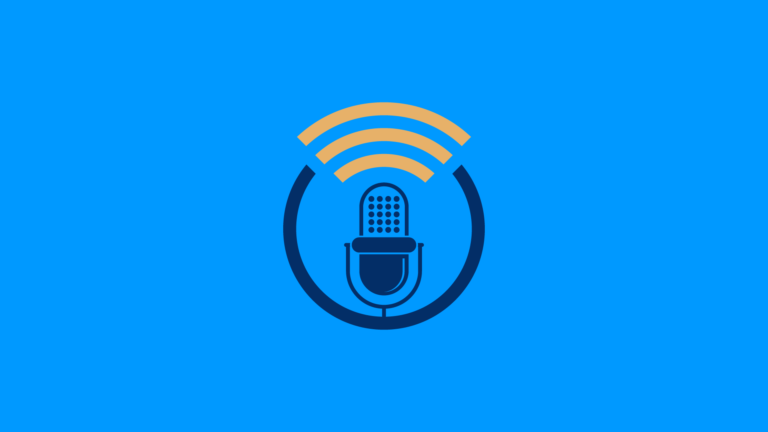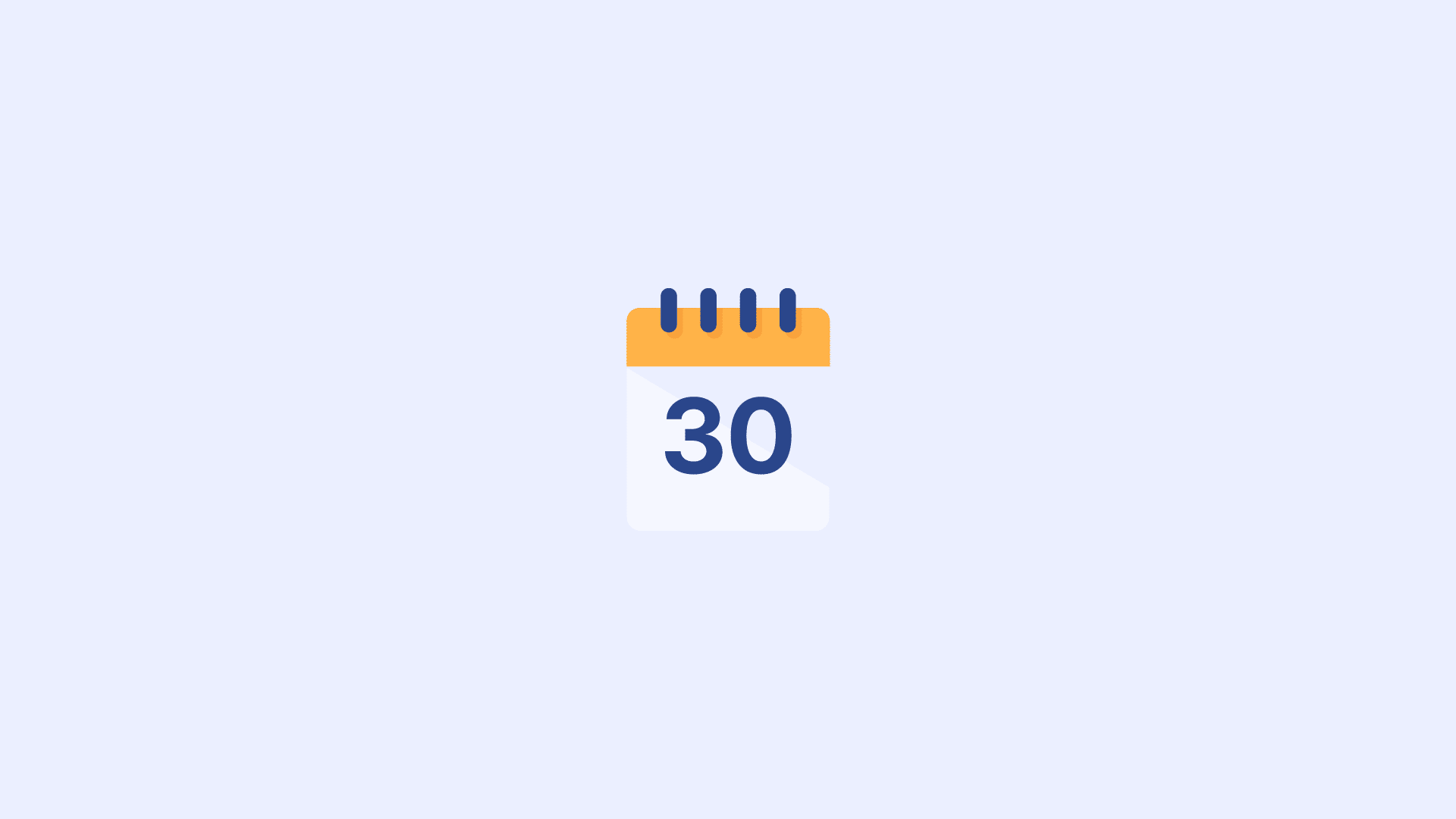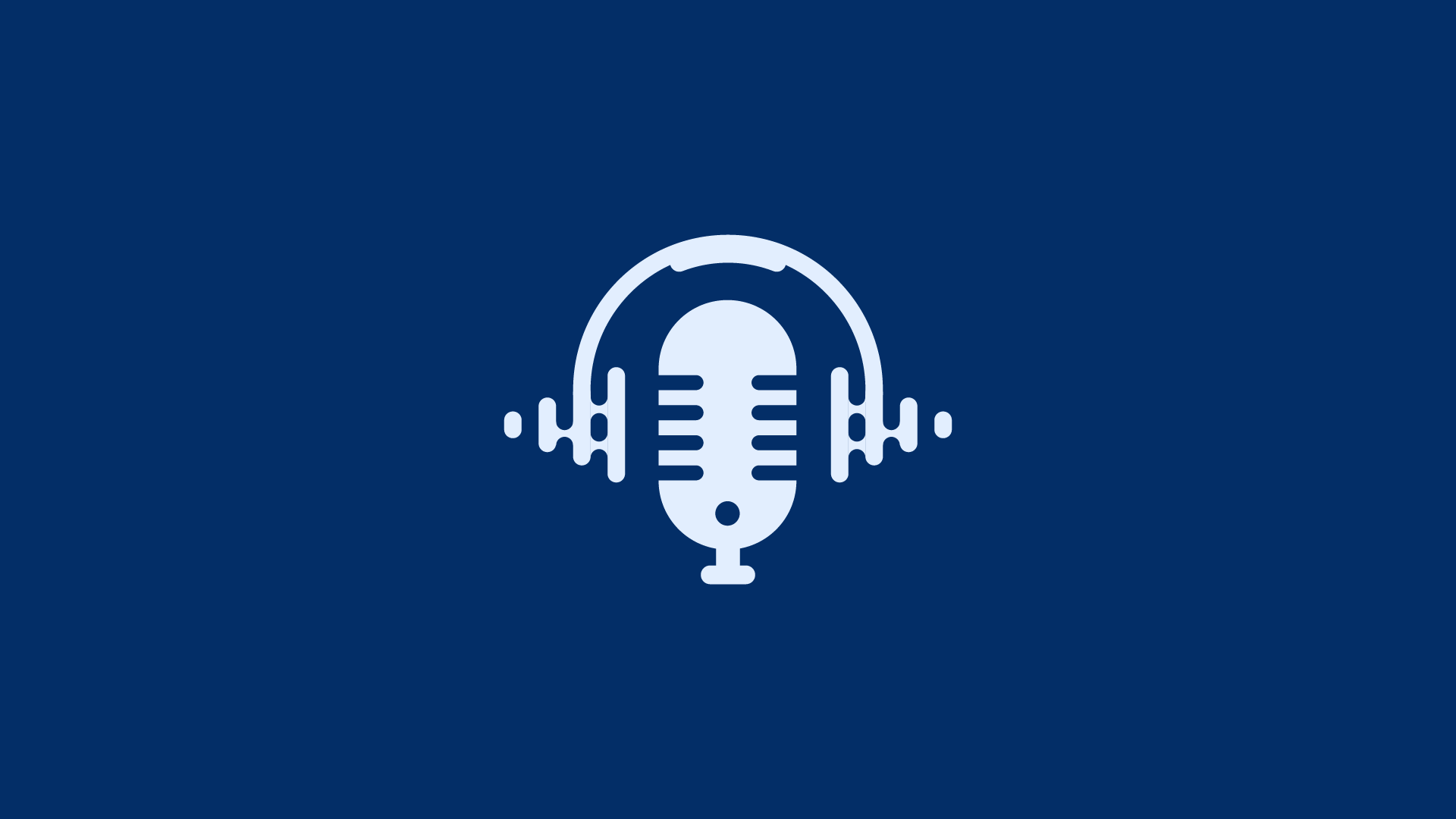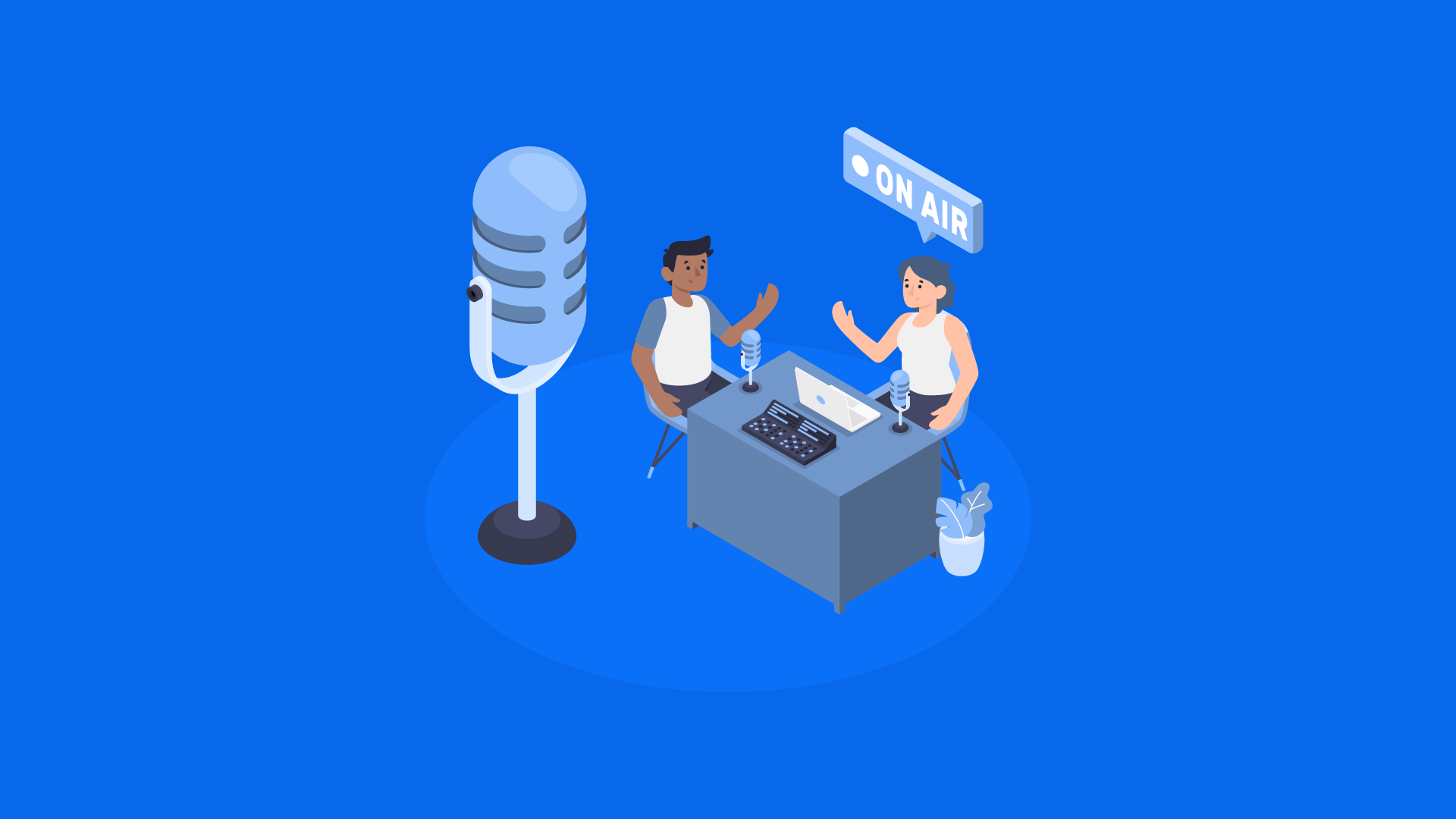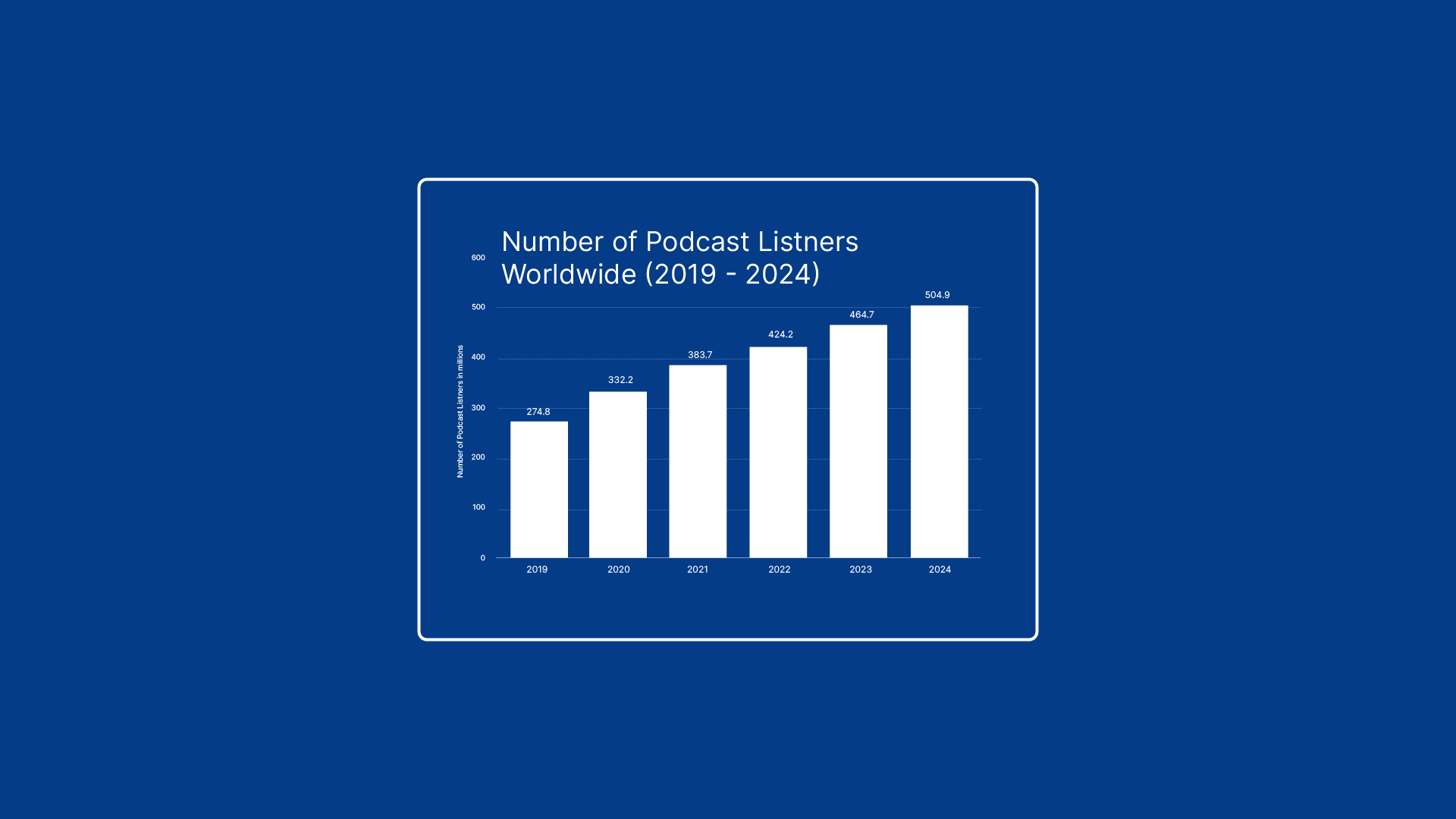You’ve probably heard all the buzz about podcasts. Well, you’re in luck. Podcasting is a fantastic hobby and an incredible way to make money online. The best part? To start a podcast it’s easy! Anyone can do it.
Podcasting is an incredibly viable business model and is growing faster than ever. Anybody with audio recording software, a microphone, and a computer can start a podcast. However, getting started and making money from it is where it gets tricky.
An essential part of this initial setup is creating compelling first podcast intro artwork and podcast cover art. High-quality podcast artwork enhances first impressions in directories like Apple Podcasts, attracts listeners, and can greatly influence engagement.
That’s why we’ve created this guide. It walks you step-by-step through the process of starting your own podcast, from choosing a topic, to creating content, to getting your podcast out into the world.
What is a Podcast?
You may be wondering, what exactly is a podcast? A podcast is a series of audio recordings released episodically by a host. Podcasts are digital files that are available for download on the internet.
They can either be downloaded directly from the podcast’s website or through an application such as iTunes and Soundcloud. Podcasts are usually free to listen to when released by the creator of the podcast.
Episodic content can be incredibly addictive, with users eagerly awaiting new episodes each week in hopes they will satisfy their insatiable hunger for more content.
The structure of podcasts, where hosts narrate stories or talk about interesting topics, makes it easy to binge-listen all 50 episodes without even realizing it’s 4 am and you have to wake up in five hours for work.
Why you Should Start a Podcast
If you’re thinking about starting a podcast of your own podcast finally here, we’re here to tell you that you should absolutely go for it.
Here are 5 reasons why:
You get to be the expert in your field.
It is a great way to market yourself and your business.
It’s easy! You don’t need any expensive equipment or software—you can even record on your phone (which is where you’ll probably be doing most of your listening anyway).
Podcasting is an opportunity for a real connection with your audience. You can share stories with people who are interested in what you have to say and get their feedback on what they like or want more of (or less of).
You can build authority for your brand.
1. Understand How Podcasting Works
Podcasts are a great way to connect with others, build your brand, and build a community around your business. They can also be an incredible source of income.
You can look at podcasts like radio shows, but, there are some differences which are in the distribution and how they are consumed.
The other difference is that podcasts have a specific niche target. You can think of it as a group discussion between friends sharing fresh opinions about topics they are familiar with.
When doing a podcast, there is no regulation on what you can or cannot discuss. What makes them even better is that they are available on-demand, it’s like accessing youtube videos anytime you would like on your youtube account.
To get started with a serious podcasting journey, some work needs to go into deciding your niche topic and planning how you will deliver it to your target audience. Planning each podcast episode is crucial, as it involves determining the optimal episode length, recording and editing steps, and crafting engaging descriptions.
2. Define Your Podcast Concept
Defining your podcast concept is a crucial step in creating a successful podcast. Your concept should be clear, concise, and unique, aligning with your target audience’s interests and needs. Here are some tips to help you define your podcast concept:
Identify your niche: What topic do you want to focus on? What are you passionate about? Whether it’s true crime, personal finance, or video podcasts, choose a subject that excites you and has a dedicated audience.
Determine your format: Will your podcast be an interview-style show, a solo show, or a panel discussion? Decide on a format that suits your style and the content you want to deliver.
Develop your unique angle: What sets your podcast apart from others in your niche? Find a unique perspective or approach that makes your podcast stand out.
Create a mission statement: What is the purpose of your podcast? What do you hope to achieve? A clear mission statement will guide your content and help you stay focused.
Focus on podcast artwork: High-quality podcast artwork is essential for establishing your brand identity and attracting listeners. Ensure your cover art is visually appealing and adheres to technical specifications to improve visibility on platforms like Apple Podcasts and Spotify.
By defining your podcast concept, you’ll be able to create content that resonates with your audience and sets you apart from other podcasts in your niche.
2. Find a Theme or Topic for your Podcast
It’s important to find a topic or theme that you can easily discuss and provide value to people. This is the subject matter you’ll cover in every episode, so it’s crucial to find something that fits all these points:
You are passionate about it. This can be anything from your favorite TV show, your job, or a hobby you’re skilled at.
You can provide value. Is there something you can teach your listeners? Are there some interesting facts and stories you can share that no one else knows? Find something where you are an authority on the topic.
It’s not too niche. Avoid topics that only appeal to very specific audiences or people who already have extensive knowledge about it (e.g., quantum physics). You want as many people as possible to listen and engage with your podcast!
It’s not too broad. Topics like true crime or sports are popular because they have wide appeal, but keep in mind that it may be more difficult for new listeners to quickly understand what sets your podcast apart from similar ones out there if the subject matter is too general. If this step seems daunting, don’t worry—there are plenty of resources online with tips on how to choose the right topic for your podcast!
3. Create a Podcast Format
Your podcast format is the structure that your podcast episodes must follow. You’ll want to determine the format for each episode title your podcast and consider the role of the podcast host in each format.
The three common podcast formats are
Solo The simplest podcast format is one where a single person hosts the show and speaks for the duration of the segment. This can be done alone or with remote guests.
Multichannel host: This kind of show includes multiple hosts who are in the same room together. It often sounds more conversational and less formal than a solo show. This is what you’d see on shows like The Joe Rogan Experience, in which one host interviews a guest on the show and then occasionally speaks with another co-host off-camera.
Remote interviews: This format includes remote interviews with several different special guests. They’re typically interviewed one at a time, and each interview is interspersed with a conversation between the host and the guest, as well as longer breaks between interviews.
Scripted non-fiction. Typically, these podcasts have a single theme for the entire season. Think Serial.
Scripted fiction. These podcasts are similar to radio dramas and are often scripted and highly produced.
There are a wide variety of formats out there, from the interview style to solo-cast. Don’t be afraid to experiment with different formats until you find one that fits you best.
You can go in and change your initial format after a few episodes if you aren’t satisfied with the results. For example, if you start with an interview-style podcast, but don’t love it, you can always pivot to a solo cast later on down the line.
4. Find a Unique Offering and Choosing a Name
You’ll have to find the right balance between appealing to your target audience and distinguishing yourself from your competitors.
After the events of the 2020 pandemic, the world audio podcasts has changed. Podcasts are now one of the most important sources of information and entertainment for many people.
There are many reasons why you might want to start a podcast now, from making money to sharing your thoughts with the world. Regardless of your reason for starting a podcast, once you have your unique offering you can put a name podcast name next to it.
There is no right or wrong name for your new, podcast app, but there are some things that will make it easier on yourself before diving into this process headfirst.
Choose a name for your show notes podcast that is memorable and easy to remember. It should also be something that represents what type of show you want it to be (i.e. funny, educational).
In addition, try finding an available domain name so people can access your podcast music website easily after listening. A website will also extend your reach by being found on google and other search engines.

5. Choose Equipment and Recording software
To record your podcast, you need a voice-over microphone, headphones, and editing tools and software.
Once you have your podcast idea in place, it’s time to purchase the equipment needed to record it. You’ll need a microphone that records directly into your computer (a USB or XLR microphone).
Choosing the right podcast software is crucial for recording and editing your episodes. There are various options available, both free and paid, that can cater to different needs such as capturing multiple audio tracks or providing remote recording capabilities.
The most popular microphones are the Blue Yeti, Audio-Technica AT2020USB+, and Rode NT-USB. The first two cost around $100 while the last one costs around $180.
It’s also important to wear a pair of headphones while recording so you can hear what you’re saying without the mic picking up on the sound. This will help you tell if you’re talking too loudly or quietly and help with any other issues that might be occurring during the recording.
For editing, there are several options available:
Audacity is free but can be challenging for beginners;
Garageband comes with Macs and is easy for newbies;
Hindenburg Journalist Pro is an audio editor that costs $300 but has great features like tagging and noise reduction.
There are also programs like Zoom (free) or Skype ($15 per month) that allow you to record calls either in person or remotely between multiple people at once. This could be useful if your podcast involves interviews with guests from around the world!
It all depends on how much money/time you want to spend creating this project. Fortunately, there are plenty of options out there regardless of budget constraints.
Choosing Recording software
Choose podcast software that will make this process as simple as possible. There are various options available for recording and editing podcast interviews, including both free and paid software. Remember that your listeners will encounter the intro and outro first, so make it sound professional.
To make this process as easy as possible, we recommend using a dedicated software program to record and edit your podcast. Some of the features you should be looking for are:
Recording multiple audio tracks simultaneously
Cut and splice individual clips features
Adding music or sound effects in the background
Noise reduction or hiss removal from your recording
Export format for your final product in a format that you can use (e.g. MP3)
Cost is another thing you’ll want to consider, although there are some free options available. We also recommend making sure that any software you choose has great reviews and is easy to use.
It’s important that you’re able to get comfortable with the program before actually beginning work on your podcast, so check out any tutorials ahead of time and make sure there’s a support team available if needed.
Video Podcast Equipment
When it comes to recording a video podcast, you’ll need some additional equipment beyond what’s required for an audio-only podcast. Here are some essentials to consider:
A high-quality camera: You can use a dedicated camera or a smartphone with a good camera. Consider the resolution, frame rate, and low-light performance when choosing a camera.
A microphone: While your camera may have a built-in microphone, it’s often better to use a separate microphone to ensure high-quality audio. Consider a lavalier microphone or a shotgun microphone.
Lighting: Proper lighting is essential for a visually appealing video podcast. Consider using a combination of natural light and artificial light sources, such as LED panels or softbox lights.
A tripod: A tripod will help you stabilize your camera and reduce shaky footage.
A pop filter: A pop filter can help reduce plosive sounds and prevent distortion in your audio.
When choosing video podcast equipment, consider your budget, the type of content you’re creating, and the level of production quality you want to achieve. Investing in good equipment will enhance the overall experience for your viewers and make your video podcast stand out.
7. Record Your First Episode
Recording your first episode of youtube podcast can be a daunting task, but with some preparation and practice, you’ll be ready to go. Here are some tips to help you record your first episode:
Prepare your equipment: Make sure you have all the necessary podcast equipment, such as a microphone, headphones, and a computer. Test your setup to ensure everything is working correctly.
Choose a quiet space: Find a quiet space with minimal background noise to record your episode. This will help improve the audio quality and make your podcast more enjoyable to listen to.
Plan your content: Decide on the topic and format of your episode, and create an outline to guide you. Having a clear plan will help you stay on track and cover all the important points.
Practice your delivery: Practice your delivery to ensure you’re comfortable with the material and can speak clearly and confidently. This will help you sound more natural and engaging.
Record a test episode: Record a test episode to ensure your equipment is working properly and to get a feel for the recording process. This will help you identify any issues and make adjustments before recording the final episode.
By following these tips, you’ll be able to record a high-quality first episode that will set the tone for your podcast.
8. Edit Your Audio
Editing your first audio file is an important step in creating a professional-sounding podcast. Here are some tips to help you edit your audio:
Use audio editing software: Choose a software that you’re comfortable with, such as Audacity or Adobe Audition. These tools offer a range of features to help you edit your podcast episodes.
Remove unnecessary parts: Remove any unnecessary parts of the recording, such as mistakes or pauses. This will help keep your podcast engaging and to the point.
Adjust audio levels: Adjust the audio levels to ensure they’re consistent throughout the episode. This will improve the overall listening experience.
Add music or sound effects: Add music or sound effects to enhance the listening experience. This can help set the mood and make your podcast more dynamic.
Export your final episode: Export your final episode in a format that’s compatible with your podcast hosting service. Most podcast hosting platforms accept MP3 files, which are widely supported and easy to work with.
By editing your audio, you’ll be able to create a polished and professional-sounding podcast that will engage your audience.
6. Differentiate your Podcast by Building a Brand
The podcasting industry has evolved rapidly in recent years, and there’s no shortage of podcasts to choose from. However, the difference between the most popular ones today and those in the early days is striking. One key factor in building a strong brand identity and attracting listeners is high-quality podcast artwork, which plays a critical role in establishing a podcast’s visual appeal and visibility on platforms like Apple Podcasts and Spotify.
The first podcasts were easily dismissed as amateurish productions filled with questionable content, without much thought given to the underlying quality of their storytelling or production values.
Today’s podcasts are a far cry from those crude origins, they’ve evolved into fully-realized productions that aspire to excellence.
The way they’re produced is just as important as what they produce (if not more), and it’s worth taking a moment here to discuss some common characteristics of modern podcasts that differentiate them from those produced twenty years ago.
7. Choose a Podcast Hosting Platform
Choose from several different hosting options available on the internet. As with many things in life, there’s more than one way to host a podcast. Here are some of the most popular options:
Blubrry
An RSS feed is a crucial component in podcast hosting and distribution. It serves as a unique identifier for your podcast, allowing platforms like Apple Podcasts and Spotify to access and publish episodes automatically, thus facilitating the sharing of your podcast content across various directories.
This list is by no means exhaustive—there are plenty of other hosting providers out there, but these five are the most common. Most offer different subscription tiers, taking into account how much storage space you want and how many downloads per month you expect to get.
We go into detail in this post about the best podcast hosting platforms.
Some providers let you self-host for free, although those accounts generally come with limitations like a small amount of storage space or a limited number of downloads per month.
8. Decide your Podcast Distribution Channels
There are several podcast platforms and directories out there where you can distribute your podcast. Submitting your podcast to various platforms, such as Apple Podcasts and Spotify, is crucial for making it discoverable through search engine optimization (SEO). Here is our top pick for must-haves.
Apple Podcasts (formerly iTunes)
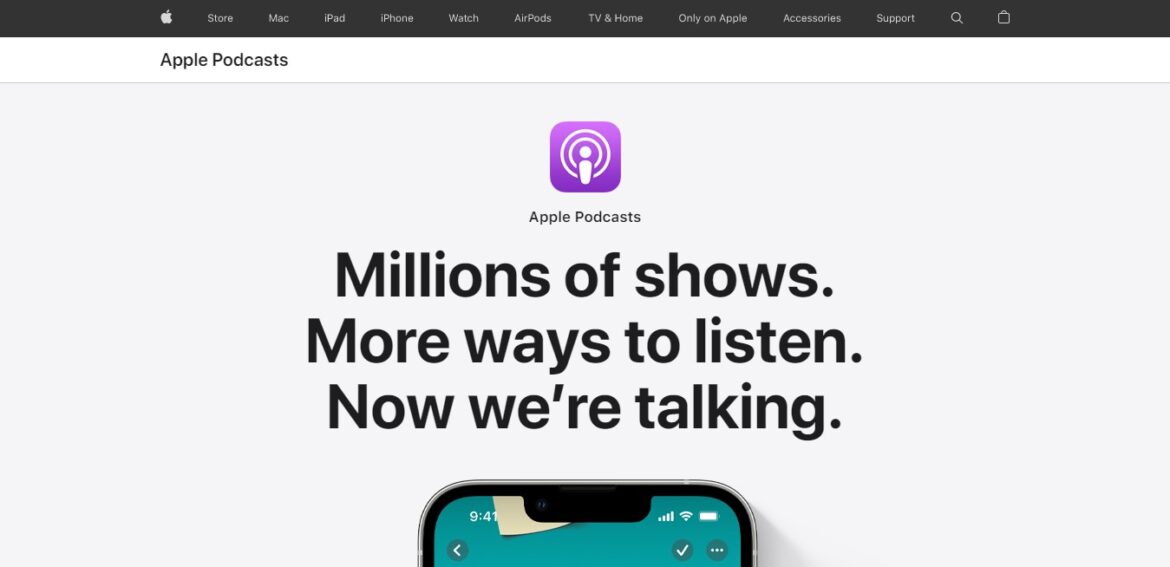
Apple Podcasts is the biggest podcast directory in the world, and that’s not going to change anytime soon. Being featured on Apple Podcasts is a great way to get exposure to millions of listeners who are already looking for shows like yours.
Google Podcasts
Google’s foray into podcasts is still in its early stages compared to Apple, but it’s already a top contender. Google has a strong focus on machine learning and AI, which can help surface your show to listeners Google thinks will love it.
Spotify
Spotify is currently one of the fastest-growing podcast directories out there. The platform has a very different user base than many of the other directories on this list: in addition to the many listeners who use Spotify for music, there are over 180 million Spotify users who aren’t subscribed to a premium account and use the streaming service for royalty free music only.
Stitcher
Stitcher is one of the most popular podcasts streaming apps available, with over 2 million active monthly users across iOS and Android devices. One of its best features is integration with several car manufacturers, including Ford, Chevy, BMW, Volvo, Jaguar/Land Rover, and more! This means your show could be played by default while people are driving these cars.
Submit to Apple Podcasts and Other Directories
Once you’ve created your podcast, it’s time to submit it to popular directories like Apple Podcasts, Spotify, and Google Podcasts. Here’s a step-by-step guide to submitting your podcast:
Apple Podcasts:
Go to the Apple Podcasts website and click on “Submit a Podcast.”
Enter your podcast’s RSS feed URL and click “Next.”
Fill out the required information, including your podcast’s title, description, and artwork.
Click “Submit” to submit your podcast for review.
Spotify:
Go to the Spotify for Podcasters website and click on “Get Started.”
Enter your podcast’s RSS feed URL and click “Next.”
Fill out the required information, including your podcast’s title, description, and artwork.
Click “Submit” to submit your podcast for review.
Google Podcasts:
Go to the Google Podcasts website and click on “Submit a Podcast.”
Enter your podcast’s RSS feed URL and click “Next.”
Fill out the required information, including your podcast’s title, description, and artwork.
Click “Submit” to submit your podcast for review.
Make sure to follow the guidelines and requirements for each directory, and be patient as your podcast is reviewed and approved. Submitting to multiple directories will increase your podcast’s visibility and help you reach a wider audience.
12. Promote Your Podcast
Promoting your podcast is crucial to attracting and retaining listeners. Here are some tips to help you promote your podcast:
Create a podcast website: Create a website for your podcast to promote your episodes and provide additional information to your listeners. A website can also help with SEO and make it easier for new listeners to find your podcast.
Use social media: Use social media platforms to promote your podcast and engage with your audience. Share new episodes, behind-the-scenes content, and interact with your listeners to build a community around your podcast.
Reach out to other podcasters: Reach out to other podcasters in your niche to collaborate and cross-promote each other’s podcasts. This can help you reach new audiences and grow your listener base.
Optimize for SEO: Optimize your podcast for search engines to increase visibility and attract new listeners. Use relevant keywords in your podcast title, description, and episode titles to improve your search rankings.
Run contests or giveaways: Run contests or giveaways to incentivize listeners to share your podcast with others. This can help increase your reach and attract new listeners.
Focus on podcast artwork: Ensure your podcast artwork is visually appealing and meets technical specifications. High-quality artwork can establish your brand identity and improve visibility on platforms like Apple Podcasts and Spotify.
By promoting your podcast, you’ll be able to attract and retain listeners, and grow your audience over time.
13. Grow Your Podcast Audience
Growing your podcast audience requires ongoing effort and engagement. Here are some tips to help you grow your podcast audience:
Consistency is key: Release new episodes on a consistent schedule to keep your audience engaged. Whether it’s weekly, bi-weekly, or monthly, stick to a schedule that works for you and your listeners.
Engage with your audience: Respond to comments and messages from your listeners to build a loyal community. Show appreciation for their support and encourage feedback to improve your podcast.
Collaborate with other podcasters: Collaborate with other podcasters in your niche to reach new audiences. Guest appearances, joint episodes, and cross-promotions can help you expand your reach.
Offer exclusive content: Offer exclusive content or bonuses to incentivize listeners to subscribe to your podcast. This could include bonus episodes, behind-the-scenes content, or early access to new episodes.
Analyze your metrics: Analyze your metrics to understand your audience’s behavior and adjust your strategy accordingly. Use podcast hosting services that provide detailed analytics to track your performance and identify areas for improvement.
By following these tips, you’ll be able to grow your podcast audience and increase your reach and influence.
14. Launch Your Podcast
Congratulations! You’ve made it to the final step: launching your podcast. Here’s a checklist to ensure a successful launch:
Finalize your podcast’s artwork and description: Make sure your podcast cover art is eye-catching and your description is compelling and includes relevant keywords.
Write and schedule social media posts: Promote your podcast on social media platforms to generate buzz and attract listeners.
Reach out to influencers or other podcasters: Collaborate with influencers or other podcasters in your niche to expand your reach.
Optimize your podcast’s website for search engines: Use SEO best practices to make your podcast website more discoverable.
Submit your podcast to popular directories: Ensure your podcast is available on Apple Podcasts, Spotify, Google Podcasts, and other major platforms.
Launch your podcast and make it available to the public: Announce your launch and encourage listeners to subscribe and leave reviews.
Remember, launching a podcast is just the beginning. Be prepared to promote and market your podcast regularly to attract and retain listeners.
15. Celebrate Your Launch
You did it! You’ve launched your podcast and made it available to the world. Take a moment to celebrate your achievement and reflect on the hard work you’ve put into creating your podcast.
Share your podcast on social media: Encourage your friends and family to listen and share your podcast.
Write a blog post or create a video: Promote your podcast and share your experience with your audience.
Reach out to other podcasters or influencers: Collaborate or promote your podcast to reach a wider audience.
Take a break and relax: You’ve earned it! Enjoy the moment and recharge for the next steps.
Remember, launching a podcast is just the beginning. Be prepared to continue promoting and marketing your podcast to attract and retain listeners. Good luck!
How to Monetize your Podcast
There are many ways to monetize your podcast including sponsorships and donations.
There are many ways to generate revenue for your podcast or public radio station once you’ve made it. A well-crafted podcast description plays a crucial role in attracting sponsors and listeners by clearly communicating what the podcast is about and incorporating relevant keywords.
Some of the more popular options include****sponsorships, donations, affiliate marketing, merchandising, coaching, speaking gigs, hosting your own live event, or selling ad space on your website.
Sponsorships are a pretty straightforward way of generating revenue, companies will pay you (or an agency) a “representation fee” for every time their product is mentioned by you as part of your show.
Sponsorships are so common today that some podcasters get paid thousands of dollars per month from just one company alone.
Requesting Sponsorships
To get started with sponsorship opportunities, contact companies directly via email. If they don’t respond within 3-4 weeks after reaching out to them about sponsoring you specifically for an upcoming show, consider contacting them again with a different approach.
You can ask them if there are any other shows featuring similar topics in which they could partner with you:
“Hi [name], I am doing a new podcast interview series on [topic] and would like to speak to [company]. Are there any opportunities for me to reach out and discuss sponsorship opportunities? Also, may I ask if I could touch base with you regarding this conversation? Thank you!”
If they do respond positively and want to work together, send them an email 2-3 weeks before the scheduled interview asking if they can sponsor the episode in exchange for exposure on your podcast feed.
A small representation fee will be paid so long as the sponsorship is mentioned at least once during the episode or another aspect of the broadcast (like social media promotions).
Make sure they have access to all relevant information including all dates/times/podcast feeds and links to social media accounts where relevant content can be found; who knows how many times this simple step was missed! Ask if there’s anything else specific that should be covered beforehand.
Starting a Podcast is Easier Than you Think
Starting a podcast is much easier than it seems. Keep the following in mind:
Consider exploring the concept of a video podcast, which can significantly enhance listener engagement by combining audio and visuals. Platforms like Spotify and YouTube have seen a growth in the popularity of the video format for podcasts, making them a valuable format to attract a wider audience.
Your first episode doesn’t have to be perfect. You will make mistakes and you will sound awkward. That is completely normal, especially if you are new to audio production! Trust in your voice, trust in your message and remember that you can always change your format later on if it’s not working for you.
Don’t worry about how many listeners you have at your launch party, worry about the quality of your content and giving value as early as possible. Don’t get caught up comparing yourself with other podcasters that have been doing this for years instead stay focused on your why.
Frequently Asked Questions (FAQ)
How does a beginner start a podcast?
Starting a podcast as a beginner involves a few key steps:
Choose a podcast topic that you are passionate about and that has an audience.
Decide on a podcast format that suits your style and content.
Gather the necessary podcast equipment, such as a good podcast microphone and recording software.
Record your first podcast episode, ensuring high audio quality.
Edit your audio files using podcast editing software to create a polished final product.
Choose a podcast hosting service to upload and distribute your episodes.
Submit your podcast to directories like Apple Podcasts and Spotify to reach a wider audience.
How much does it cost to start a podcast?
The cost of starting a podcast can vary widely depending on your needs and goals. At a basic level, you can start a podcast for free using minimal equipment like a smartphone and free podcast recording and software. However, for better audio quality and a more professional setup, you might invest in a good podcast microphone, an audio interface, and paid podcast hosting services. On average, starting a podcast can range from $100 to $500, but costs can increase if you opt for more advanced equipment and software.
How do podcasts get paid?
Podcasts can generate revenue through several methods, including sponsorships, listener donations, affiliate marketing, and selling merchandise. Additionally, some podcasters offer premium content or ad-free episodes for a subscription fee. Building a large and engaged audience is key to attracting sponsors and monetizing your podcast effectively.
How do I start a podcast for free?
To start a podcast for free, you can use free recording software like Audacity or GarageBand, and host your podcast on platforms that offer free plans, such as Anchor. Use your smartphone or a basic microphone for recording, and promote your podcast through social media and free podcast directories to grow your audience without incurring costs.
